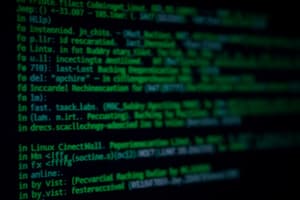Podcast
Questions and Answers
What does the kernel use a subsystem for?
What does the kernel use a subsystem for?
- To load kernel modules
- To manage hardware devices (correct)
- To handle user input
- To manage system logs
Which command provides a summary of RAM and swap space in the system?
Which command provides a summary of RAM and swap space in the system?
- vmstat
- top
- htop
- free (correct)
What directive in GRUB Legacy defines an operating system to boot?
What directive in GRUB Legacy defines an operating system to boot?
- system
- os
- boot
- title (correct)
What characterizes systemd compared to traditional runlevels?
What characterizes systemd compared to traditional runlevels?
Which directories are located in the /etc/rc.d directory?
Which directories are located in the /etc/rc.d directory?
Which command reveals both the current and previous runlevel?
Which command reveals both the current and previous runlevel?
What is virtual memory commonly referred to as?
What is virtual memory commonly referred to as?
The first process that the kernel launches is known as what?
The first process that the kernel launches is known as what?
What command do you use with fdisk to change a partition type?
What command do you use with fdisk to change a partition type?
Which command initializes a swap space?
Which command initializes a swap space?
What does the first field in the /etc/fstab file indicate?
What does the first field in the /etc/fstab file indicate?
How is filesystem usage displayed by default with the df command?
How is filesystem usage displayed by default with the df command?
What type of information do inodes store about a file?
What type of information do inodes store about a file?
Which command is specifically used to remove a package using rpm?
Which command is specifically used to remove a package using rpm?
What error message would ldd report for an inaccessible library?
What error message would ldd report for an inaccessible library?
What is necessary for executing the fsck command?
What is necessary for executing the fsck command?
Flashcards
Linux Module Loading Command
Linux Module Loading Command
The command used to load a module and its dependencies into the Linux kernel.
Kernel Hardware Management
Kernel Hardware Management
The kernel component that manages how the operating system interacts with hardware.
RAM/Swap Space Summary
RAM/Swap Space Summary
Command to show a summary of available RAM and swap memory.
CPU Summary
CPU Summary
Signup and view all the flashcards
Init Process
Init Process
Signup and view all the flashcards
Boot Process First Stage
Boot Process First Stage
Signup and view all the flashcards
GRUB Operating System Selection
GRUB Operating System Selection
Signup and view all the flashcards
GRUB Boot Timeout
GRUB Boot Timeout
Signup and view all the flashcards
fdisk command for partition type change
fdisk command for partition type change
Signup and view all the flashcards
fdisk command for creating a new partition
fdisk command for creating a new partition
Signup and view all the flashcards
Command to activate swap space
Command to activate swap space
Signup and view all the flashcards
mount point definition
mount point definition
Signup and view all the flashcards
First field in /etc/fstab
First field in /etc/fstab
Signup and view all the flashcards
Commands to display mounted filesystems
Commands to display mounted filesystems
Signup and view all the flashcards
Default block size for df command
Default block size for df command
Signup and view all the flashcards
What inodes store
What inodes store
Signup and view all the flashcards
Study Notes
Linux Commands and Concepts
-
Module Loading: The
modprobecommand loads modules including dependencies. -
Kernel Module Management: The kernel's subsystem manages hardware devices through a driver.
-
System Resource Summary:
freedisplays RAM and swap space usage. -
CPU Information:
lscpushows CPU summary details. -
Initial Process: The kernel launches the
initprocess first. -
Boot Process Stages (Order): 1. Firmware (BIOS/UEFI), 2. Bootloader (LILO/GRUB), 3. Kernel, 4. Init.
-
GRUB Legacy Directives:
title: Defines an operating system to boot.timeout=: Sets automatic boot delay.
-
Systemd Targets: Systemd uses targets instead of runlevels.
-
Runlevels and Systemd: The same services are not started/stopped at different runlevels in Systemd. (False)
-
Runlevel Display:
runlevelshows both current and previous runlevels. -
/etc/rc.dDirectories: Containsrc*.ddirectories (rc0.d...rc6.d) -
HTTP Service Restart:
service httpd restartor/etc/init.d/httpd restart -
Device Names:
/dev/hda1indicates an IDE device. -
User Home Directories: User home directories are typically found in
/home. -
Virtual Memory Synonym: Swap memory.
-
Main OS Files Directory: The bulk of the OS files are typically stored in
/usr. -
Partition Type Change (fdisk): Use the
tcommand to change partition type. -
New Partition Creation (fdisk): Use the
ncommand to create a partition. -
Swap Space Activation:
swaponactivates initialized swap space. -
Mount Point Definition: A mount point is an empty directory for accessing a filesystem.
-
fstabFirst Field: Thefstabfirst field specifies the device to mount. -
Mounted Filesystems Display:
mountanddfdisplay mounted filesystems. -
dfBlock Size:dfby default displays in KB blocks. -
Inodes: Inodes store a file's metadata.
-
Directory Size Display:
dudisplays directory size. -
System Shutdown:
init 0shuts down the system. -
Missing File Identification: Missing files use an inode number.
-
fsck Execution Conditions:
fsckis run on unmounted filesystems. -
RPM Package Management: RPM commands require root privileges.
-
RPM Package Removal: Use
rpm -eto remove a package. -
RPM File Content and Extraction:
rpm2cpiocan list or extract RPM file contents. -
Library Accessibility Errors:
lddreports "not found" if a library is inaccessible.
Studying That Suits You
Use AI to generate personalized quizzes and flashcards to suit your learning preferences.




